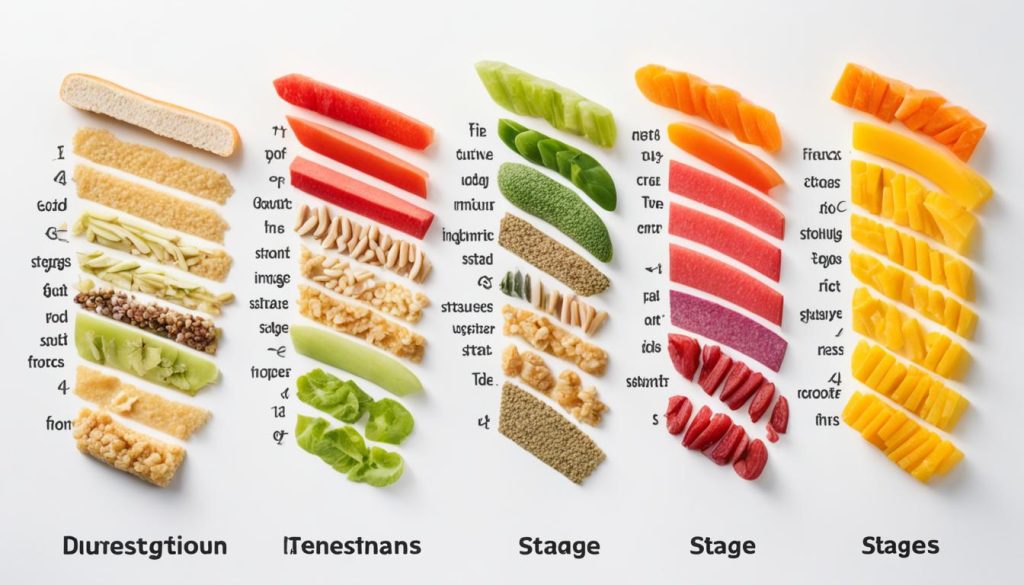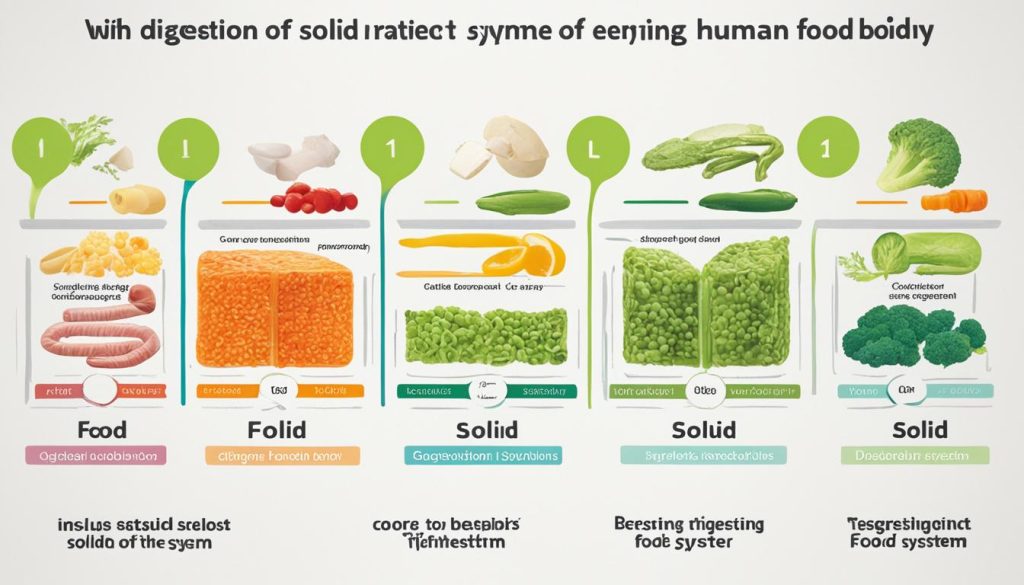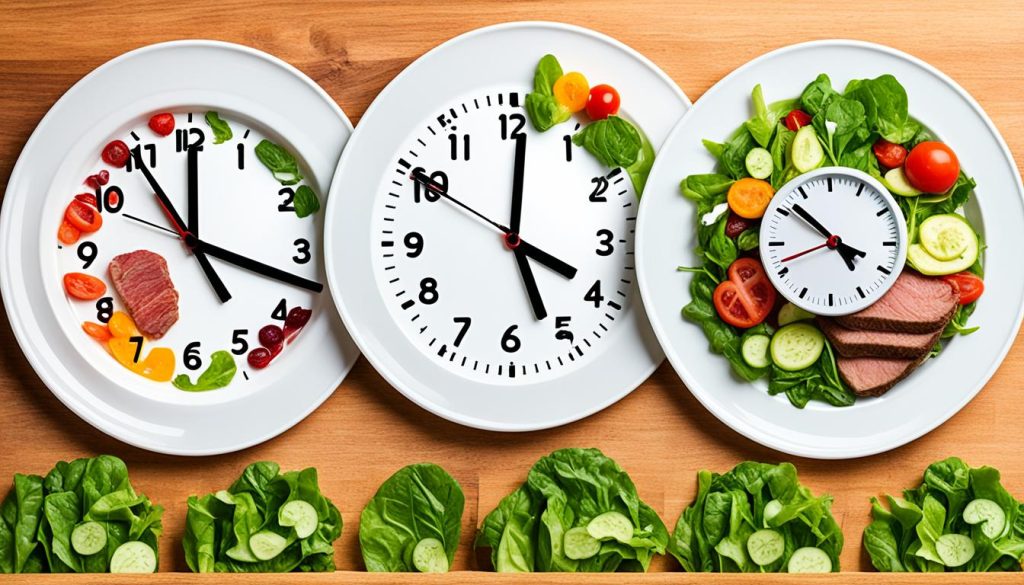The journey of food through your digestive system takes approximately two to five days, depending on the individual. After you eat, it takes about six to eight hours for food to pass through your stomach and small intestine. Food then enters your large intestine for further digestion and absorption of water, a process that takes about 36 hours. Overall, the entire digestion process from swallowing food to elimination takes about two to five days.
Factors Affecting Digestion Duration
When it comes to the digestive process, several factors can influence its duration. Understanding these factors can help individuals make informed choices about their diet and digestive health. Let’s take a closer look at some key factors that affect the duration of digestion.
Individual Variations
Each individual’s digestive system is unique, and factors such as metabolism and body type can impact the speed at which food is digested. Metabolism refers to the rate at which the body converts food into energy. A faster metabolism may result in a quicker digestion process, while a slower metabolism may lead to a longer duration.
Type of Food Consumed
The type of food consumed plays a significant role in digestion duration. Different foods require varying amounts of time to break down and be absorbed by the body. For example, foods high in fiber may take longer to digest compared to processed foods. Additionally, the composition of food, such as its fat or protein content, can influence the speed at which it is digested.
Health Conditions
Certain health conditions can affect the transit time of food through the digestive tract. For instance, individuals with irritable bowel syndrome (IBS) or chronic constipation may experience slower digestion. These conditions can impact the overall speed and efficiency of the gastrointestinal digestion process.
To enhance your understanding of the factors affecting digestion duration, refer to the table below for a comprehensive overview:
| Factor | Description |
|---|---|
| Individual Variations | Metabolism and body type influence digestion speed. |
| Type of Food Consumed | The composition and fiber content impact digestion duration. |
| Health Conditions | Conditions like IBS and chronic constipation affect digestive transit time. |
By considering these factors, individuals can gain a better understanding of their own digestive processes and make choices that promote optimal digestion and overall wellbeing.
How Long Does it Take for Food to Digest?
Different Digestion Durations for Various Foods
The duration of digestion varies depending on the type of food. Understanding how long it takes for different foods to digest can help individuals make informed dietary choices and plan their meals accordingly. Let’s explore the digestion periods of various food groups:
Carbohydrates
Carbohydrates are typically digested relatively quickly, within a few hours. Once consumed, enzymes in your saliva and small intestine break down carbohydrates into smaller molecules like glucose. These molecules are then absorbed into the bloodstream, providing energy to your body.
Proteins
Proteins take longer to digest compared to carbohydrates. The digestion process begins in the stomach, where hydrochloric acid and enzymes break down proteins into smaller peptides and amino acids. This process can take up to two days, as proteins require more complex breakdown for absorption.
Fats
Fat digestion takes the longest among macronutrients. After being broken down by bile acids and enzymes in the small intestine, fats are absorbed into the bloodstream as fatty acids and transported to various tissues for energy utilization. The digestion of fats can take several days, depending on the fat content and overall digestive health.
Fruits and Vegetables
Fruits and vegetables, especially those rich in fiber, tend to be digested more quickly compared to other food groups. Fiber adds bulk to your diet and promotes bowel movements, aiding in the efficient elimination of waste. These foods are typically digested within a day, although the exact digestion period may vary depending on the specific type of fruit or vegetable.
Table: Digestion periods of different foods
| Food Group | Average Digestion Period |
|---|---|
| Carbohydrates | A few hours |
| Proteins | Up to two days |
| Fats | Several days |
| Fruits and Vegetables | Within a day |
Understanding the digestion duration of different foods can help individuals structure their meals for optimal energy and nutrient absorption. It’s important to remember that digestion can vary from person to person, and factors such as overall health, gut bacteria, and individual metabolism may influence digestion speed.
Stages of Food Digestion
Food digestion occurs in several stages, each playing a crucial role in breaking down the food we eat and extracting nutrients for our bodies to use. Let’s dive into the different stages of food digestion and understand how our bodies process what we eat.
Mouth
The journey of food digestion begins in the mouth. As we take a bite, our teeth break down the food into smaller, more manageable pieces. Simultaneously, saliva mixes with the food, making it easier to swallow and initiating the breakdown of carbohydrates through enzymatic activity.
Stomach
Once the food leaves the mouth, it travels down the esophagus and enters the stomach. In the stomach, gastric juices, including stomach acid and enzymes, further break down the food. This process involves the breakdown of proteins into amino acids, facilitated by enzymes like pepsin. The stomach’s acidic environment also helps kill bacteria present in the food.
Small Intestine
After the stomach, the partially digested food moves into the small intestine. The small intestine is the primary site for nutrient absorption in our bodies. Here, the remaining food is broken down into smaller molecules, such as glucose, fatty acids, and amino acids, to be absorbed into the bloodstream and used for energy and other bodily functions.
The small intestine has three sections: the duodenum, jejunum, and ileum. Each section plays a role in nutrient absorption, with the majority taking place in the duodenum. The small intestine’s inner lining is covered in small finger-like projections called villi, which increase the surface area for nutrient absorption.
The time it takes for food to digest in the small intestine varies depending on various factors, including the type of food consumed and individual digestive health. On average, it takes approximately four to six hours for food to pass through the small intestine.
Large Intestine
From the small intestine, the undigested food material enters the large intestine, also known as the colon. In the large intestine, water and electrolytes are absorbed while the remaining undigested waste material is converted into stool. Friendly bacteria present in the large intestine also play a role in the fermentation of undigested carbohydrates, producing certain vitamins in the process.
The entire process of food digestion, from the moment we take a bite to the elimination of waste, generally takes between 24 and 72 hours. Factors such as the type and quantity of food, individual metabolism, and digestive health can influence the duration of each stage of digestion.

| Stage of Digestion | Description | Duration |
|---|---|---|
| Mouth | Chewing, saliva mixing, carbohydrate breakdown | A few minutes |
| Stomach | Protein breakdown, sterilization | 2-4 hours |
| Small Intestine | Nutrient absorption (mainly in the duodenum) | 4-6 hours |
| Large Intestine | Water absorption, waste material conversion | 12-48 hours |
Digestion Rate of Food vs. Liquids
When it comes to digestion, the rate at which food and liquids are processed differs significantly. Liquids, such as water, have a tendency to be absorbed more rapidly in the stomach and small intestine. On the other hand, solid food necessitates more time for digestion and the absorption of nutrients. This distinction in digestion rate can be attributed to various factors including the composition of the food or liquid being consumed.
High-fiber foods, for example, take longer to digest compared to processed foods. The reason behind this disparity lies in the intricate structure of fiber-rich foods. Fiber passes through the digestive system mostly intact, providing bulk and aiding in regular bowel movements. This process takes time and contributes to a slower digestion rate.
On the contrary, processed foods often lack these dietary fibers, resulting in faster digestion. These foods tend to be easily broken down into simpler components, allowing for more rapid absorption of nutrients.
Comparison of Digestion Rate: Food vs. Liquids
To understand the different digestion rates between food and liquids, the following table compares the typical timeframes for digestion:
| Food or Liquid | Digestion Timeframe |
|---|---|
| Liquids (e.g., water) | Generally quicker digestion and absorption |
| Solid Food | Requires more time for digestion and nutrient absorption |
| High-Fiber Foods | Take longer to digest than processed foods |
In summary, the digestion rate of food and liquids varies significantly. While liquids are typically absorbed more rapidly, solid food, especially high-fiber options, takes longer to digest. Incorporating a balanced diet with diverse food choices, including fiber-rich options, can contribute to a healthy digestive system.

Consulting with a healthcare professional or nutritionist is recommended for specific dietary needs or concerns regarding digestion.
Factors Affecting Digestion Speed
Several factors can impact the speed of digestion. It is important to consider both lifestyle factors and dietary choices in order to optimize digestion and maintain overall digestive health.
Dietary Factors
The foods we consume play a significant role in digestion speed. Certain foods, such as high-fat or high-fiber foods, can slow down the digestive process. These foods require more time to break down and can cause symptoms like bloating and indigestion. On the other hand, a diet rich in fiber can help regulate digestion and promote bowel regularity.
Lifestyle Factors
Our lifestyle choices can also impact digestion speed. Stress levels and physical activity can both affect the digestive process. High levels of stress can lead to slower digestion and contribute to symptoms of indigestion. Engaging in regular physical activity, on the other hand, can help stimulate digestion and maintain a healthy digestive system.
Signs of Slow Digestion
Recognizing the signs of slow digestion is important for maintaining digestive health. Some common signs include:
- Feeling full for an extended period after meals
- Experiencing discomfort or bloating after eating
- Irregular bowel movements
- Experiencing frequent indigestion or heartburn
Improving Digestion Naturally
There are several natural ways to improve digestion and promote a healthy digestive system:
- Eat a balanced diet: Include a variety of fruits, vegetables, whole grains, and lean proteins in your meals.
- Stay hydrated: Drinking an adequate amount of water can help maintain healthy digestion.
- Manage stress: Practice stress-management techniques such as meditation and exercise to support optimal digestion.
- Chew food thoroughly: Properly chewing your food can aid in the digestion process.

| Factors Affecting Digestion Speed | Impact on Digestion |
|---|---|
| Dietary choices | Can either slow down or enhance digestion, depending on the types of foods consumed. |
| Lifestyle factors | Stress levels and physical activity can influence the speed of digestion. |
| Signs of slow digestion | Recognizing the signs can prompt necessary lifestyle and dietary changes to improve digestion. |
| Improving digestion naturally | Adopting healthy habits, such as a balanced diet and stress management techniques, can naturally enhance digestion. |
Conclusion
Understanding the digestion process is crucial for making informed dietary choices and managing digestive health. The duration of food digestion can vary from person to person and depends on factors such as individual metabolism and the types of food consumed.
On average, it takes between two to five days for food to complete its journey through the digestive system. However, specific foods and factors can influence digestion speed. To gain a better understanding of digestion duration for different foods, consulting a food digestion time chart can provide valuable insight.
For women, the digestion process follows a similar timeline as for men, with variations based on individual factors. Knowing how long it takes for a woman to digest food can help tailor dietary choices to optimize digestive health.
FAQs
Is 2 hours enough to digest food?
Two hours may not be sufficient time for complete digestion of a meal. The digestion process varies depending on the type and size of food consumed, along with individual factors such as metabolism and digestive health.
How long does it take for food to empty from the stomach?
Food typically leaves the stomach and enters the small intestine within 2-6 hours after a meal. However, this timing can vary based on factors like the composition of the meal and individual digestive processes.
How long does it take to fully digest food and poop it out?
The time it takes for food to fully digest and be eliminated as waste varies but generally ranges from 24 to 72 hours. Factors influencing digestion speed include fiber content, hydration levels, and overall gut health.
Does it take 30 minutes to digest food?
While some foods may pass through the stomach relatively quickly, the full process of digestion usually takes longer than 30 minutes to break down and absorb nutrients effectively.
Why does my stomach feel empty 2 hours after eating?
Sensations of an empty stomach shortly after eating could be due to rapid digestion, high-fiber meals, or potentially underlying digestive issues. It could also be linked to hormonal factors affecting hunger signals.
How long after eating can I lay down?
To aid digestion and reduce the risk of issues like acid reflux, it’s generally recommended to wait at least 2-3 hours after eating before lying down. This allows gravity to assist in the digestion process and helps prevent discomfort.


